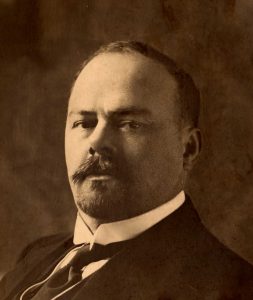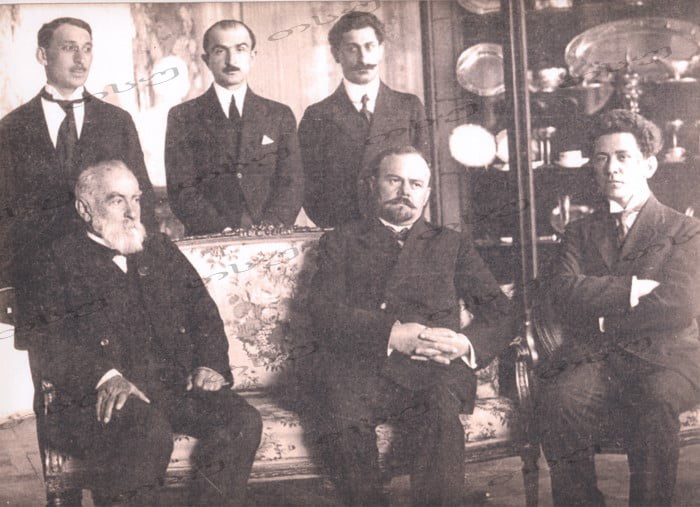Confidential Telegram of the Foreign Minister
In the weeks preceding Georgia’s declaration of independence, since 11 May 1918, Akaki Chkhenkeli, the President of the Cabinet of the Trans-Caucasus Federation and, simultaneously, its Foreign Minister is negotiating with the Ottomans in Batumi, while the military situation in and around Georgia continues to deteriorate. On 22 May, he sends this confidential letter to his colleagues:
22 May 1918, in the town of Batumi
(Received and filed by the National Council under N 866 on 25 May)
Highly Confidential
To the National Council of Georgia and the President of the Executive Committee:
President of the Council and the Committee N. Jordania has already departed to Tbilisi when I read several fresh newspapers, and I would like to say a couple of words concerning that.
Our newspapers are still debating, whether Georgia should be declared an independent state, while it is of paramount importance to make a decisive step right now. In general, it shall be stated that these newspapers feel no responsibility; they fail to even fathom, that their publications are read here [by the peace talks participants] and their news are used; none of them [the newspapers] are imbued with statesman-like spirit. At the very least, they could have sought some understanding at the National Council on which topics we shall be extremely cautious – we could not even achieve this much.

When the motherland is facing the abyss, what we need is not squabbles, but concentration of all vital energies, so that the nation is not left wanting for the contribution of even one handful of people. When one reads the newspapers, one can not feel the heartbeat [of the nation?], press does not express its aspiration.
Up until the last moment, I had hoped that we could strike a peace deal in the name of Trans-Caucasus. Certainly, our Tatars (Azeris) have undermined the unity of the delegation with their separate actions, since the German delegation was not fully in line with the Turkish position, my hopes were well-founded. Turks, indeed, did not dare to send an ultimatum, despite their threats, but they have deployed another tactic: they are implementing their policy of conquest practically – they have assaulted the Yerevan governorship, [and] have installed their own puppet government in Ganja, which would lead to alignment of the whole Aderbaijan [with the Ottomans], Georgia is thus left alone, and threatened from all sides. Finally, [head of the German delegation] Gen. Von Lossow came to a conclusion, that only protestations won’t do, and decided to try another way.
Thus, Georgia is left in isolation, with three courses of action [at its disposal]: a) Georgia creates single state with Aderbaijan. This means full Turkish domination, which is unacceptable. At the time when the Turks are holding Aderbaijan, and Trans-Caucasus government still exists, such a union connotes de jure recognition of the Ottoman rule, which will be followed by a factual conquest; b) Georgia creates united state with Armenians. Currently, there practically is no Armenian territory in Trans-Caucasus, since it is being controlled by the Ottomans, so this option is impossible. Even if there was [an Armenian-controlled] territory, even then, statehood union with the Armenians is not advisable, since this is unacceptable for Turks, as well as for the Tatars. In this case, potential of conquest [of Georgia by the Ottoman Empire] is even more obvious. c) Georgia’s independence – this is the only solution. Even in this case, we are not ensured against Turkish invasion, but precisely [to ward off] such a tragic possibility, it shall be preceded by our declaration of independence, so that we could at least hold the ground on legal rights.
Von Lossow came to me today, I have acquainted him with my ideas, and he categorically stated, that only one road is open – declaring Georgia’s independence. He has sent a note to his government, that Trans-Caucasus no longer exists (the Ottoman position has annihilated it), only Georgia exists now, which will declare independence tomorrow and would ask for recognition and protection. He is awaiting new instructions, but we have already discussed some practical matters. As soon as we declare independence, the German emissary to the [Georgian] government will be appointed (Schulenburg is considered) in the rank of the Ambassador; consular representatives will be appointed in towns; the prisoners of war from Austria and Germany will be promptly transformed into soldiers under Georgian government’s command, so that the German protection of Georgia is made factually demonstrable to the Ottomans…all of these would be arranged as soon as I receive an official note of Georgia’s declaration of independence.
As soon as this note is received, allied state governments will receive a formal notification from the side of the German-Ottoman delegation. Peace talks would then follow, since Trans-Caucasus Federation will cease to exist under international law, and hence not in a position to conclude treaties.
We can not be certain of the Ottoman reaction, when faced with these facts. Some say, that Ottomans will welcome these news and will try to reach a deal with Georgia. Others argue, that this is impossible. In the first case, the peace deal can be signed here, especially if the German delegation participates; in the second case, we should only lodge a formal protest against the military invasion and combat the bandits [irregulars – ed.] mercilessly if they are not wearing the Ottoman uniform. In the second case, Von Lossow will leave here to personally meet Wilhelm and the Chancellor, and I would have to go with him, so that the measures are taken promptly to protect Georgia’s independence.
The documents are there. Notes have been exchanged between the four governments, that Georgia will be recognized the moment it declares independence. This happened by the end of the past year, and the Ottoman government has signed this Note this January. There are no preconditions, the document is binding for all four sides.
Georgia’s independence shall be declared without listing its borders. According to the mentioned Notes Batumi area, Sokhumi and Zakatala districts are [listed as] parts of Georgia. Mentioning them explicitly [in the Act of Independence] would lead to an extreme escalation. If we omit them [while listing other borders] we would renounce our legal rights to them. These matters shall be left to the confidential actions of the Foreign Minister and an agreement with the German government.
In Sokhumi district, factual control is in our hands. The detachments shall stay there, even more shall be added, accompanied by the German Consul as well as several [ex-POW] soldiers and an officer, so that in this way Germany’s formal protectorate is declare there as well.
We need a lot of tactfulness towards Abkhazia-Samurzakano. We should put it into their ear, that Turkish invasion is possible – this is indeed planned. In such case, people, especially in Samurzakano, will definitely rise up. All ex-soldiers must be called up, discipline of steel established in the army. If the Turks approach [the shores], resist them without hesitation, they won’t be able to land many [soldiers], this is without doubt. If we are pressed – retreat towards Samurzakano, this is our base. In the meantime, call the Congress of Abkhazia-Samurzakano, which would express its political will, which would be as follows: Abkhazia-Samurzakano wishes to join, as a separate state, the Caucasus – it must be Caucasus – confederation, but until this becomes feasible, it allies, as an equal, with Georgia to protect its very existence. The [local] nobility shall not be alienated, any use of revolutionary phraseology, except the need to protect independence and freedom of the motherland, would scare the Abkhazians off and push them into who knows which abyss.
Georgia’s [cabinet of] ministers shall absolutely be a coalition, simple [in structure] and comprising competent people. The portfolio of social protection shall be abolished and transferred to the Home Affairs minister. The Labor Ministry shall become a special portfolio within the Ministry of Industry and Trade. Railway Minister shall supervise all other roads as well as shipping. The matters of faith shall move to the Ministry of Education. Postal Service-Telegraph – to Home Affairs. The State Controller [Auditor] is not a member of the cabinet, and operates independently outside the Council of Ministers. The National Council is temporarily serving as the Parliament, and the government is accountable to it.
I have finished. I am not writing anything new here, you would deliberate better – what is the most important, Georgia’s independence shall be proclaimed immediately. There is no other way. Perhaps, this is not our salvation either, but it [the independence] would soon find its protector.
In such a critical moment it is a crime to dither, to fear. We must be lucid, firm and audacious. In a blink of an eye, we shall be ready to take measures for securing calm.
Nothing is done without the risk. Who has ever created a state, without taking a risk? So we need audacity, audacity, and more audacity still.
Salutations.
Ak. Chkhenkeli
This post is also available in: ქართული
